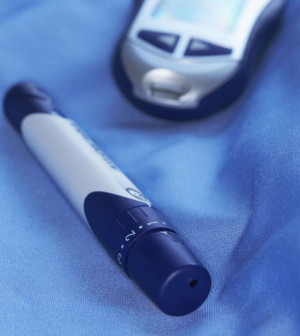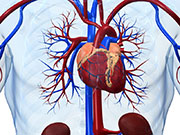- Could Your Grocery Store Meat Be Causing Recurring UTIs?
- Are You Making This Expensive Thermostat Error This Winter?
- Recognizing the Signs of Hypothyroidism
- 10 Strategies to Overcome Insomnia
- Could Artificial Sweeteners Be Aging the Brain Faster?
- Techniques for Soothing Your Nervous System
- Does the Water in Your House Smell Funny? Here’s Why
- Can a Daily Dose of Apple Cider Vinegar Actually Aid Weight Loss?
- 6 Health Beverages That Can Actually Spike Your Blood Sugar
- Treatment Options for Social Anxiety Disorder
Study Finds No Added Benefit From Routine Heart Scans for Diabetics


Routine screening for heart disease isn’t effective for people with diabetes who have no symptoms but are at high risk for a heart attack, according to a new study.
Researchers found the screenings do not help prevent heart attacks or help patients avoid being admitted to the hospital for unstable angina (chest pain that occurs when the heart doesn’t receive enough oxygen-carrying blood).
Properly controlling diabetes is still the best way to manage risks for heart-related complications, the study authors said.
The findings were published Nov. 17 in the Journal of the American Medical Association, to coincide with a presentation of the study at the American Heart Association annual meeting in Chicago.
“We found that the best treatment to prevent heart attacks and death among diabetics is excellent diabetes management,” lead researcher Dr. Brent Muhlestein, said in a journal news release. Muhlestein is director of cardiovascular research at the Intermountain Medical Center Heart Institute in Murray, Utah.
Diabetes is a key risk factor for heart disease. Although people with diabetes may not develop any symptoms, they often have significant heart damage. As a result, heart disease is the most common cause of death associated with the blood-sugar condition, the researchers explained.
For the study, Muhlestein’s team examined the effectiveness of using an advanced form of imaging technology, known as coronary computer CT angiography (CCTA) screening, to help reduce deaths, heart attacks and hospitalizations among people with diabetes.
This 64-slice imaging technique is a non-invasive way for doctors to look at the heart to detect hardening of the arteries, or a build-up of plaque in the coronary arteries. Previously, screening tests were only able to detect if blood flow to the heart declined due to a partial or complete artery blockage.
“Many diabetics die from heart disease before they ever have any typical heart attack-related symptoms,” said Muhlestein. “The question was whether screening for the presence of silent heart disease in these patients would be helpful.”
The study involved more than 900 people with diabetes. The researchers randomly selected participants to undergo screenings or pursue standard diabetes management, which involved ongoing care by a doctor.
Of the patients who were screened, those diagnosed with silent heart disease received more aggressive treatment to help prevent heart problems.
After four years, the screenings resulted in a slight increase in the number of heart procedures and use of drugs to manage high cholesterol levels. The researchers noted, however, there was little change in the number of deaths, heart attacks and cases of unstable angina.
The study authors concluded the benefits of the screenings were not significant enough to justify a change in the current standard of care for people with diabetes.
“Previous studies have shown that CCTA screening is nearly as good as standard invasive heart catheterization in defining coronary arteries. Because of this, we hoped this new technology would help us identify heart disease in high-risk patients who don’t have symptoms, and thereby allow us to better care for them,” Muhlestein said. “However, it turned [out] that the excellent standard of care offered to diabetic patients is just as effective.”
More information
The American Heart Association has more on diabetes and heart disease.
Source: HealthDay
Copyright © 2026 HealthDay. All rights reserved.










